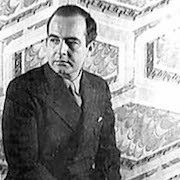Ottorino Respighi (/rɛˈspiːɡi/ reh-SPEE-ghee, also US: /rəˈ-/ rə-; Italian: [ottoˈriːno reˈspiːɡi]; 9 July 1879 – 18 April 1936) was an Italian composer, violinist, teacher, and musicologist who was one of the leading Italian composers of the early 20th century. His compositions range over operas, ballets, orchestral suites, choral songs, and chamber music, and include transcriptions of pieces from Italian composers of the 16th, 17th, and 18th centuries and works of Bach and Rachmaninoff. Among his best known and most performed works are his three Roman tone poems, which brought him international fame: Fountains of Rome (1916), Pines of Rome (1924), and Roman Festivals (1928). All three demonstrate Respighi's use of rich orchestral colours.
Born and raised in Bologna, Respighi studied violin, viola, and composition at the Liceo Musicale di Bologna. He also worked in Saint Petersburg and studied briefly with Nikolai Rimsky-Korsakov. In 1913, Respighi moved to Rome, where he became professor of composition at the Liceo Musicale di Santa Cecilia. He left the school to dedicate his time fully to composing.
While composing his opera Lucrezia in early 1936, Respighi was diagnosed with bacterial endocarditis. He died four months later aged 56. His wife Elsa Respighi outlived him for almost 60 years, championing her late husband's works and legacy until her death in 1996.














